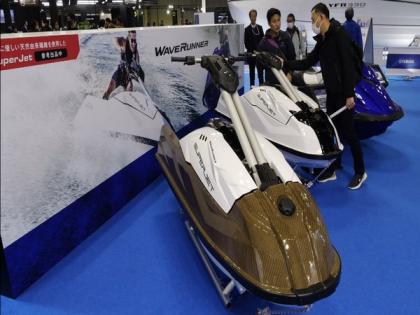Yamaha introduces environmentally protective watercraft
By ANI | Published: April 3, 2024 07:08 PM2024-04-03T19:08:33+5:302024-04-03T19:10:06+5:30
Yokohama [Japan], April 3 : Japanese company Yamaha prioritises its mission of contributing to decarbonisation, prominently showcased at the ...

Yamaha introduces environmentally protective watercraft
Yokohama [Japan], April 3 : Japanese company Yamaha prioritises its mission of contributing to decarbonisation, prominently showcased at the Japan International Boat Show in Yokohama City.
Here, the company introduced environmentally protective personal watercraft, featuring components made from flax plants.
These components serve as an alternative to traditional glass fibre components, retaining the distinct pattern of flax while contributing to environmental protection efforts.
Kazunori Kochiya, Senior Supervisor, Yamaha Motor, said, "We are working towards contributing to carbon neutrality through the use of flax fibre, starting with initial trials. As development progresses, we aim to apply environmentally friendly materials to larger parts and eventually to the entire boat. Sales are still undecided at this stage of development evaluation, but we are committed to striving to make a positive environmental impact."
Another innovation involves the installation of cellulose nano-fibre reinforced resin as an engine part, developed in cooperation with a paper company.
This marks the first instance of such an installation in a transportation machine.
Ren Onodera, Senior Supervisor, Yamaha Motor, said, "A new type of engine has been installed in these personal watercraft. This marks the first instance of a new output engine being introduced after a 15-year hiatus. Take note of the black part of the engine cover, which incorporates a new biomass material. This material, produced by cellulose nano-fibre-reinforced resin, utilises wood-derived components."
"To achieve carbon neutrality by 2050, this innovation captures CO2 from the air through the use of plant-derived reinforced resins, thus contributing to carbon neutrality. Cellulose nanofiber is not only 25 per cent lighter than conventional materials but also stronger than iron by more than five times. Moving forward, we aim to expand the application of this technology beyond personal watercraft to include motorcycles and other products," he added.
Yamaha made a significant and practical contribution to environmental conservation at this boat show.
Leading the charge in decarbonisation efforts both on land and in the water, Yamaha is setting the standard for sustainable practices in the industry.
Disclaimer: This post has been auto-published from an agency feed without any modifications to the text and has not been reviewed by an editor
Open in app